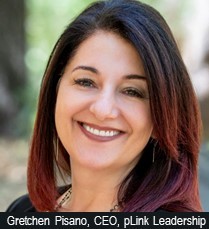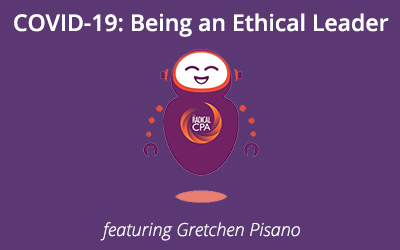What does ethics mean to you? I know we all take a required amount of Ethics CPE every year. Maybe you had an Ethics course in college. We know the difference between right and wrong but being a leader during a major crisis like COVID-19 brings into question a lot of gray area. Not just ethical decisions, but how we think about those decisions and how they’re affecting other people. It’s hard, right?! And I think it’s something that a lot of CPAs have been struggling with – being an ethical leader in a COVID-19 environment.

Back with me again for another session of Let’s Get Radical … Live, Gretchen Pisano, CEO of pLink Leadership, to talk through some of these issues we’re seeing, and how CPAs can lead ethically. I’ve been so grateful to Gretchen for sharing her time and knowledge with us during these sessions, and this was another really insightful discussion.
We talked about what “ethics†looks like in a coronavirus environment.
Maybe a client applied for PPP funding but didn’t really need it. Maybe you encouraged it; “just in case.†Maybe you know someone whose business is staying open despite not being considered “essential.â€
Everyone has different moral principles and those principles influence our ethical beliefs. The decisions that we as leaders and CPAs need to make are not always clear cut, and we know this.
As business leaders, we have to make tough decisions every day. It seems like we’re making more tough decisions than ever with COVID-19 going on. While many things are still so uncertain, I asked Gretchen how we should approach our ethical beliefs and decision-making process.
When we’re operating in an environment with significant and sudden changes, decisions still need to be made. There’s no roadmap for this, like we talked about a few sessions ago. There’s no precedent for “this is what we need to do†or “this is what we should be doing.†When we talk about ethics, Gretchen said, we’re really talking about being values-driven.
The most important part about this is knowing what your values are, which ones you will absolutely stand behind, and which ones are more flexible. That might sound a little funny, because we’re used to thinking about values as right or wrong. It’s deeper than that, though, and more nuanced.
Gretchen mentioned a free online assessment called VIA, or Values In Action. It’s a character strengths and assessment tool that provides a little insight on 24 different character strengths, like leadership, social intelligence, courage, honesty, fairness, and many others. You can read more about the VIA assessment here.
We don’t all rank these values the same way. So when we make a decision, it’s an ethical decision, not a legal decision, she explained. This is important, because in the world of accounting, we do have the difference between the letter of the law and spirit of the law. Ethics comes in when people start saying “I’m following the letter of the law,†but maybe they’re not abiding by the spirit of the law. And if you happen to be a person who holds honesty and fairness in your top five most important values, it’s going to be an ethical issue for you.
Something to keep in mind right now is, it’s easy to be generous when you have more than enough. It’s easy to be generous with money when you have more than enough. But when scarcity comes into play and people start being more individualistically centered, it’s vital to keep the letter of the law. You want to be 100 percent sure that the decision you’re making is legal, because if it’s not, it can totally unravel your life. A decision that’s unethical is in the eye of the beholder and the community in which you operate. Judgment really matters. As a CPA, or a business owner, you need to know what your judgment is.
When you have integrity and your decisions are in line with your values, it’s like fuel. It’s confidence. You’ll be able to stand your ground better and make braver decisions. Ethics is intrinsically rewarding like that. But if you make decisions that are outside of alignment with your values, it takes a ton of self-regulation to do that. Because you’re making yourself do something that you don’t actually believe in. If you do that over and over again, it becomes a pattern. You become less effective and as a human being, less like the person you want to be. You spiral.
You may be telling yourself, “this is silly. Of course, I know what I believe in.†Okay. But what about what your clients believe? Let’s say your client did something totally illegal, but outside of your ethical bounds, do you say something? Do you not say something? Do you kind of pass it off and say “we’re in uncertain times here and everyone is reacting a little different.†It’s ethics, right? And it’s not so straightforward as we would think.
Remember hearing in the news how national restaurant chains scooped up tens of millions of dollars in PPP funding? Some ended up giving that money back when they realized that so many small businesses didn’t get it at all. Or when they were pressured to do so. Either way, this may not have been a truly ethical decision, maybe a PR one, but it was interesting. Did they need the money in the first place? No? Then why even apply when you’re essentially taking money away from another business that needs it to survive?
What if those national chains were your clients? Would you advise them to apply anyway, or speak up and disagree with them? Would it depend on the situation? It varies based on interpretation.
In the case of, say, Shake Shack, maybe they applied for the loan because they qualified, but once they understood the broader context, that the intention of the PPP funding wasn’t met, then they gave the money back.
Here’s the bottom line: being a values-driven leader and a values-driven leadership team and culture is the path forward to sustainable business. You don’t have to try to be consistent because you are being exactly who you are. There’s no remembering what you did in one situation, then trying to do something different. You’re being courageously authentic. It’s who you are.
Each person has to make that decision for themselves. And so in our profession, maybe we have a CPA who is struggling to keep their firm afloat and they don’t want to alienate a client. And so they make a judgment that it’s okay to support the client in pursuit of this, because it’s legal. But they’re the ones who have to live with that. As an individual, a person who has leadership responsibilities that include making important decisions and bringing other people along, you need to decide if you are going to be a values-driven leader. And if so, what’s okay and what’s not. Have clear boundaries.
For example, we could say that “a rising tide lifts all ships†and you decide not to intervene if your client doesn’t really need the money. Or, you say to your client “It’s against my principles that you would apply for this loan when I know that you don’t need it. This isn’t what this loan was intended for. I would love to keep working with you, but I cannot support you in this.†That is a decision you would need to make based on your beliefs.
Are you willing to walk away from work if it’s against your values? It’s legal by the letter of the law, but not the spirit. We need to go into these discussions and situations with our eyes wide open and understand what’s at stake, what the implications are.
Your team is watching you, by the way. They see how you react to situations like this, and that’s almost worse. They’re expecting something of you, and it’s your judgment call with the client, right, but are you showing up for your team and their ethical beliefs? I get that with a client, there’s a revenue stream there, and you’re considering going along with decisions you might not agree with, personally. But maybe your team will view you differently because of it.
Here’s another thing to think about: unethical behavior introduces risk into the business. Will this decision introduce risk to our brand if we continue down this path? It’s a valid question, in any environment. But now, when the stakes are so much higher, it’s worth stopping to think about. If your values are all over the place and open to interpretation, you will introduce risk to your business. Ethical behavior, on the other hand, can potentially improve the value of your brand.
Being clear about who you are and what you believe in is a conversation to have with your team, too. Let’s say you disagreed with a client’s action and told them. You put values before money. Now it’s time to broach that conversation with your team about why you made that decision, and even though we’re in unprecedented times, this is what we believe about the intention of this law and how it should be applied, and that is what will direct our decision-making.
There may not be a right answer, but everyone needs to think about their own values and how it plays out in what are essentially real-life Ethics CPE courses. We’ve also talked before in these sessions about seeking opportunities out of chaos. This is one of those opportunities.
And so we could have these conversations in our firms about operationalizing values. It’s a way to explore with yourself and your team what your top values are and how those are going to shape business decisions, because some of these decisions are morally ambiguous. Your decision-making process might be clear to you, but the values that helped shape it are invisible to your team.
Overall, it’s really important to be rallying your team in the coming weeks and start to think about what we’ve learned. Start these conversations with your team about what has already happened and what we know we would do differently from now on. Maybe it’s time to redefine our firms and cultures so we can better navigate the morally ambiguous decisions that are still coming at us.
You can watch the whole conversation with Gretchen below.

0 Comments